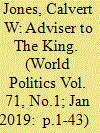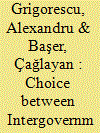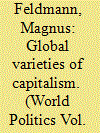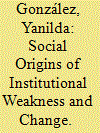|
|
|
Sort Order |
|
|
|
Items / Page
|
|
|
|
|
|
|
| Srl | Item |
| 1 |
ID:
165593


|
|
|
|
|
| Summary/Abstract |
Do experts rationalize and legitimize authoritarian governance? Although research on expert actors in contexts of democracy and international governance is now extensive, scholarly work on their role in authoritarian settings remains limited. This article helps open the black box of authoritarian decision-making by investigating expert advisers in the Arab Gulf monarchies, where ruling elites have enlisted them from top universities and global consulting firms. Qualitative fieldwork combined with three experiments casts doubt on both the rationalization and legitimacy hypotheses and also generates new insights surrounding unintended consequences. On rationalization, the evidence suggests that experts contribute to perverse cycles of overconfidence among authoritarian ruling elites, thereby enabling a belief in state-building shortcuts. On legitimacy, the experiments demonstrate a backfire effect, with experts reducing public support for reform. The author makes theoretical contributions by suggesting important and heretofore unrecognized conflicts and trade-offs across experts’ potential for rationalizing vis-à-vis legitimizing.
|
|
|
|
|
|
|
|
|
|
|
|
|
|
|
|
| 2 |
ID:
165595


|
|
|
|
|
| Summary/Abstract |
This article seeks to explain when governments are more likely to take an intergovernmental approach to resolving global collective problems rather than step back and encourage (or simply allow) nongovernmental actors to become the main global governors. The authors suggest that an important factor driving this choice is the domestic ideological leanings of powerful states toward greater or lesser government activism. Such ideologies connect domestic preferences to international ones. They also lead to the establishment of domestic institutions that, in turn, facilitate the emergence of international organizations. Using these arguments, the authors develop a set of inferences regarding the likelihood that governments will establish and join intergovernmental organizations. The authors test their hypotheses through a study of global governance in the education realm, and also apply a series of statistical analyses covering developments in all issue-areas over the last century and a half.
|
|
|
|
|
|
|
|
|
|
|
|
|
|
|
|
| 3 |
ID:
165597


|
|
|
|
|
| Summary/Abstract |
This article analyzes the prospects for globalizing the varieties of capitalism (voc) debate. It identifies and compares firm-centered, governance-centered, and state-centered approaches to extending the debate on capitalist diversity, and discusses the distinctive contributions of each approach as well as the trade-offs between them. The author draws on three agenda-setting volumes that engage with the voc framework and study capitalist diversity in three regions not usually covered by this literature: Latin America, East and Southeast Asia, and East Central Europe. As these regions play an increasingly important role in the world economy, this article examines what the books imply about the current state of knowledge about global voc. The author argues that the extension of the voc debate to these parts of the world is important for advancing the understanding of economic institutions; the approach can reinvigorate research on capitalist diversity and the institutional foundations of economic development in the current era of globalization.
|
|
|
|
|
|
|
|
|
|
|
|
|
|
|
|
| 4 |
ID:
165596


|
|
|
|
|
| Summary/Abstract |
Historians and some scholars of international relations have long argued that historical contingencies play a critical role in the evolution of the international system, but have not explained whether they do so to a greater extent than in other domains or why such differences may exist. The authors address these lacunae by identifying stable differences between war and other policy domains that render the evolution of the international system more subject to chance events than those other domains. The selection environment of international politics has produced tightly integrated organizations (militaries) as the domain’s key players to a much greater degree than other policy domains. Because there are few players, no law of large numbers holds, and because militaries are tightly integrated, microshocks can reverberate up to macro-organizational levels. The anarchic character of the international system amplifies the impact of these shocks. The authors explore these phenomena in a range of historical examples.
|
|
|
|
|
|
|
|
|
|
|
|
|
|
|
|
| 5 |
ID:
165594


|
|
|
|
|
| Summary/Abstract |
Despite historic increases in crime and violence, Latin America’s police forces are characterized by long periods of institutional weakness punctuated by rare, sweeping reforms. To understand these patterns of institutional continuity and change, the author applies the concept of structural power, demonstrating how police leverage their control of coercion to constrain the policy options available to politicians. Within this constrained policy space, politicians choosing between continuity and reform assess societal preferences for police reform and patterns of political competition. Under fragmented societal preferences, irrespective of political competition, reform brings little electoral gain and risks alienating a powerful bureaucracy. Preference fragmentation thus favors the persistence of institutional weakness. When societal preferences converge and a robust political opposition threatens incumbents, politicians face an electoral counterweight to the structural power of police, making reform likely. Using evidence from periods of continuity and reform in Argentina, Brazil, and Colombia, the author traces both outcomes to shifts in societal preferences and political opposition. Despite the imperative to address citizens’ demands by building state capacity in security provision, these cases show that police reform is often rendered electorally disadvantageous.
|
|
|
|
|
|
|
|
|
|
|
|
|
|
|
|
|
|
|
|
|